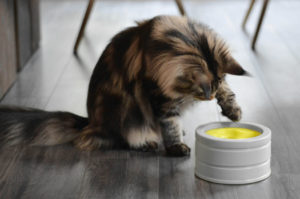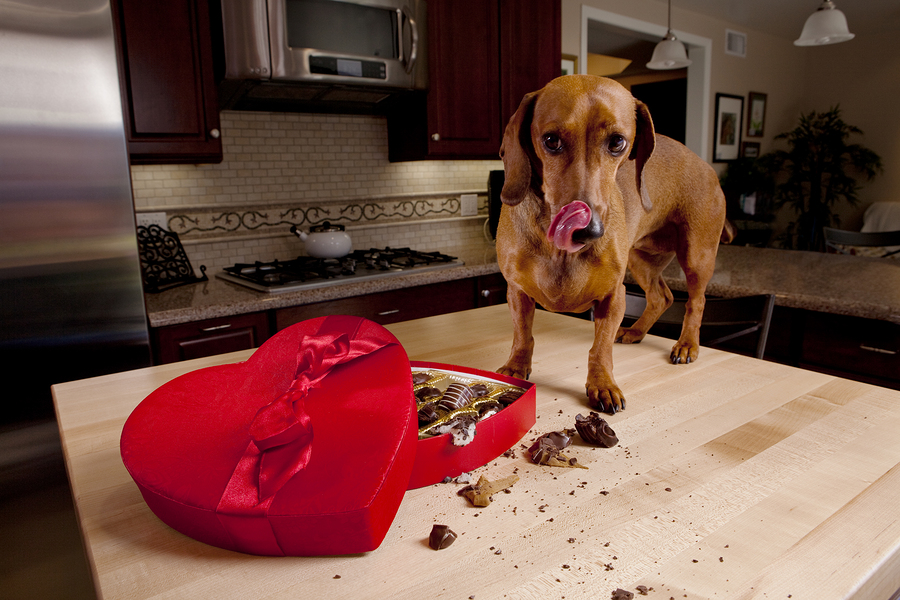Valentine’s Day is the sweetest of the holidays. It’s overflowing with boxes of chocolate and other sweet treats exchanged between lovers. While we don’t typically send Valentine’s cards or gifts to our dogs, cats or other animals, there’s no doubt that they hold a special place in our hearts. What doesn’t hold a special place in pet stomachs, though, is certain foods and drinks that they might encounter as you and your significant other enjoy a Valentine celebration. Here’s what to know about toxic treats and what you can offer instead to your furry Valentine.
Death by Chocolate?
You’ve no doubt heard many times that chocolate is toxic to pets. That’s true, but the level of toxicity depends on the size of the pet and the amount and type of chocolate ingested. Your chocolate Lab isn’t going to keel over from eating a few Hershey’s Kisses—not even if he doesn’t unwrap them first—but a smaller dog or a cat can experience more serious consequences. And the darker the chocolate, the more at risk your pet is. Watch for signs such as vomiting, diarrhea, excessive thirst, or seizures, and get your small pet to the vet ASAP if you know he has had more than a nibble or two of semisweet, dark chocolate, baking chocolate, or cocoa powder; these forms of chocolate contain high levels of theobromine, the ingredient that’s toxic to pets. A 10-pound dog who gulps down a bar of milk chocolate likely won’t have any ill effects, but a tiny Chihuahua who eats a few ounces of dark chocolate could be spending time in the ER. Cats are susceptible to chocolate toxicity as well, but because they don’t have a sweet tooth, they’re less likely than a Beagle to gobble it down.
No Champagne for Charlie or Charlotte
Sharing a sip of bubbly or other alcoholic beverages with pets during a party may seem fun or harmless, but our dogs and cats are a lot smaller than we are and ingesting even a small amount of alcohol can be harmful to them. Besides being a potent depressant that affects a variety of neurotransmitters within the central nervous system, alcohol irritates the gastrointestinal tract. Its metabolites can affect heart function. Signs of alcohol poisoning begin in as little as half an hour and include vomiting, diarrhea, staggering or falling, depression, and tremors. Pets who drink too much can die.
Grape Expectations
If you’re peeling grapes for your beloved, don’t offer any to your pets. We don’t know why, but grapes and raisins can cause kidney failure in dogs. The ASPCA’s Animal Poison Control Center advises against giving any amount of grapes or raisins to dogs. No reports have been made of grapes having the same effects in cats, but it’s best to err on the side of caution and not let pets of any kind have access to them.
Maui Macawowie
Taking your sweetheart to Hawaii for Valentine’s Day? Enjoy macadamia nuts there, but don’t bring them home and share them with your pet. Nuts of any kind seem like a harmless treat, but macadamias can have devastating effects in dogs: muscle tremors, vomiting, fever, and rapid heart rate. With supportive care, dogs can recover, but one I know of was euthanized for rear leg paralysis that developed after he ate macadamias. And chocolate-covered macadamia nuts? That’s a double whammy! Leave ‘em in the islands.
Beware Baked Goods
Many of us are trying to cut back on sugar—especially after feast-filled winter holidays—and sweet shops and bakeries often try to help by producing cakes, cookies, and candies sweetened with xylitol, a low-calorie natural sugar alcohol that’s fine for humans but deadly to pets. It’s easy for dogs and cats to ingest a lethal dose with just a few sugar-free candies or bites of baked goods. Check ingredients before you offer your pet anything sweet or, better yet, keep anything labeled sugar-free—including chewing gum—well out of reach.
Pet-Friendly Treats
 What can you give your pet for Valentine’s Day? You already give lots of love, I bet, but if you want to bring home something special, visit a pet-centric bakery and look for heart-shaped “pupcakes,” carob-coated cookies, and other grrr-eat goodies. Set out a new food puzzle filled with his fave treats. Or simply offer a few blueberries or a bite of apple, carrot, or orange. Your pet will love that it comes from you.
What can you give your pet for Valentine’s Day? You already give lots of love, I bet, but if you want to bring home something special, visit a pet-centric bakery and look for heart-shaped “pupcakes,” carob-coated cookies, and other grrr-eat goodies. Set out a new food puzzle filled with his fave treats. Or simply offer a few blueberries or a bite of apple, carrot, or orange. Your pet will love that it comes from you.
This article was reviewed/edited by board-certified veterinary behaviorist Dr. Kenneth Martin and/or veterinary technician specialist in behavior Debbie Martin, LVT.








